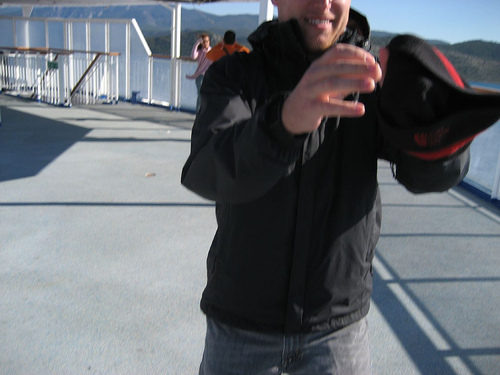A friend sent me the article today, and aside from being the second most emailed article on the NY Time's site at the moment, its, well, interesting.
The edge is publishing its annual list of scholarly (for lack of a more accurate term) responses to a question it asks at the end of each year. This year's question, with responses listed from 120 contributors, was "What do you believe is true, even though you cannot prove it?"
While some of the responses are typical aethe-scientist blather, many of them are actually quite fascinating. You'll have to scroll around a bit (the site could be organized a little more optimally, but its just not), but some I found particularly interesting were:
- The publisher's explanation at the top (not a response, per se, but read it for framing purposes)
- Daniel Goleman, "that today's children are unintended victims of economic and technological progress." This one made me instantly think of religious America's dire risk of precipitously going the way of Europe in the coming century.
- Marti Hearst, "The Search Problem is solvable." Essentially Google, carried to its logical conclusion. We'll all soon be living in the Matrix. I've been preaching this for at least 4 straight posts now.
- Randolph Nesse, M.D., "I can't prove it, but I am pretty sure that people gain a selective advantage from believing in things they can't prove. I am dead serious about this."
- Stanislaus Dahaene, "I believe (but cannot prove) that we vastly underestimate the differences that set the human brain apart from the brains of other primates." Wouldn't mammals be the correct term, based on his belief?
- Tor NØrretranders, "I believe in belief—or rather: I have faith in having faith. Yet, I am an atheist...Because we are here, we have reason for having faith in having faith." Both Tor and I believe in having faith. But only one of us has the right reasoning.
- Carlo Rovelli: Far and away my favorite at this point (I've only read about 25% of the excerpts, so far). "I am convinced, but cannot prove, that time does not exist. I mean that I am convinced that there is a consistent way of thinking about nature, that makes no use of the notions of space and time at the fundamental level. And that this way of thinking will turn out to be the useful and convincing one. I think that the notions of space and time will turn out to be useful only within some approximation..."
This is basically what I've always believed and hinted at here just recently. He goes on to speculate on human collaboration, and how it will lead to an essentially divine state - "a planet without countries, without wars, without patriotism, without religions, without poverty, where we will be able to share the world." While I don't believe that our humanity will be the vehicle to this state, I do believe we'll arrive there someday (rather, at least some of us will). But I'm with him on the time thing: "In particular, I am convinced that time is an artifact of the approximation in which we disregard the large majority of the degrees of freedom of reality. Thus "time" is just the reflection of our ignorance."
A close second favorite, is, quite astoundingly, the very next excerpt:
- John McCarthy, "I think, as did Gödel, that the continuum hypothesis is false. No-one will ever prove it false from the presently accepted axioms of set theory. Chris Freiling's proposed new (1986) axioms prove it false, but they are not regarded as intuitive.
I think human-level artificial intelligence will be achieved."
Shudder.
Anyhow, the NYT article is here. I find 2 things interesting - first, the common theme that at least a few of the 14 excerpts the Times chose, and second, the fact that one of the excerpts stood out quite clearly from the rest, both in subject and attitude of approach to the original question. See if you can guess which one I'm talking about.
(The article's link will only work for the next 29 days, if you register - for free, with the NYT. So, in a few weeks, I'll come back here and update this post with who to look for on the edge's site. Before that, however, I'll likely post again on other excerpts that I found interesting, as I get around to reading them all.)
The Empty House Studio
10 years ago















No comments:
Post a Comment